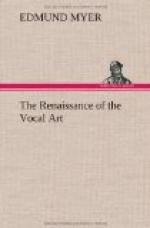The singer is a specialist, but all successful specialization rests upon the broad foundations of general culture. The reason why there are so many singers and so few artists who thrill us with the revelation of the intimate beauties of the songs of Franz, Grieg, and MacDowell, to take only a few names from the rich list of song writers, is because people sing without acquiring the range of vision which makes such interpretation possible. How can one sing, let us say, a German song, imbued with German romanticism and melancholy, unless he knows something of the German art, the German spirit, the German language, the German national characteristics? A knowledge of literature, art in general, and the “Humanities,” to use an old-fashioned word, is absolutely necessary to interpretation of a high order. Too often, alas, the singer imagines that the study of tone production, or acquaintance with musical literature, or a polished diction, will make him sing with the combination of qualities called style. Not so! Upon the broad foundations of general culture, which distinguishes the man of refinement from his less fortunate brother, rests also the specific ability to sing with distinction. Moreover, the singer must have definite musical ability, natural and developed by study. He must thoroughly comprehend rhythm, melody, and harmony in order that his attention may not be distracted from interpretative values to ignoble necessities of time and tune. It is not possible to sing Mozart, not to say Beethoven and Wagner, without acquaintance with the vocabulary and grammar of the wonderful language in which they wrote. Familiarity with the traditions of different schools of composition and performance is necessary also in order not to sing the songs of Bach and Handel like those of Schubert and Schumann, or Brahms like the modern French composers; in order not to interpret with like effects indiscriminately songs of the oratorio and opera, of Italian, German, French, English and modern Russian schools.
Unquestionably the singer must have control of the physiological and technical possibilities of his voice. No one can make words and music mean anything while he is wondering what his voice may do next. Developed intelligence, emotional richness and refinement, musical knowledge, a properly placed voice capable of flexibility and color, distinct articulation, polished diction, these are some of the preliminaries to successful interpretation in song.




